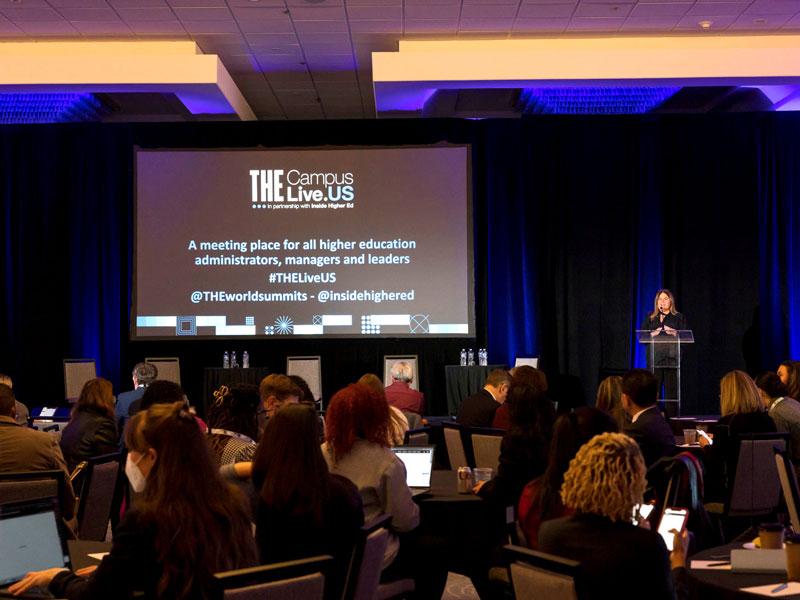
Embed skills education to mould job-ready graduates
There is debate over how higher education institutions can best offer, measure and assess the skills employers are demanding


Adobe
Learn how Adobe helps institutions incorporate digital tools into the curriculum
Incorporating digital skills and certificates into curricula can make students more attractive to employers and provide the agility needed to thrive in the future workforce.
A panel of experts from academia and industry joined a round table at THE Campus Live US, held in partnership with , to discuss evolving and embedding skills education to create more successful and employable graduates.
With students increasingly aware of changing employer demands, chair Alistair Lawrence, head of branded content at Times Higher Education, asked how institutions could embed digital literacy alongside other skills sought by employers.
Todd Taylor, pedagogical evangelist at Adobe and English professor at University of North Carolina at Chapel Hill, said the company’s Adobe Creative Campus programme encouraged students to move from “passive, disconnected consumers to active, connected producers of their own ideas”.
He said digital skills were essential for students to achieve the “four Cs” needed for successful careers: to communicate effectively, to think critically, to work collaboratively and to creatively problem solve.
“How can you do any of those things in substantial ways without the heavy involvement of digital technologies these days?” asked Taylor.
Renée Ann Cramer, deputy provost of academic affairs at Drake University, said the university had launched a campaign for digital proficiency. However, two challenges had been securing donor funding and convincing some faculty this was an effective strategy to embed job-ready skills.
“Students aren’t the hang up. [It’s] donors, funding and faculty attitudes towards how to communicate digital proficiency and [how to communicate it] to the larger world,” Cramer said.
Blakely Pomietto, senior vice-president of academic affairs and chief academic officer at the University of Maryland Global Campus, said embedding digital literacy allowed graduates to clearly demonstrate the skills they acquired.
“We all know our learners today are going to have multiple jobs and careers, it’s not a linear path,” Pomietto said. “The idea of that broader skillset that you can apply in any kind of industry or discipline area is going to serve the learner in the long term.”
One theme noticed by Sean Gill, director of the Career Center at the University of California, Riverside, was skills certificates being more highly valued by employers. He told the panel that recent data had shown employers were hiring people with skills certificates at the same rate they were hiring graduates with a bachelor’s degree.
“Wouldn’t it be great if we could offer our arts, humanities and social science students this extra thing and you’ll become more valuable by just taking this certificate paired with your art or history degree?” he said.
Alis Zakarian, assistant director of the College of Professional and Global Education at California State Polytechnic University, Pomona, warned against sacrificing other important skills for a focus on digital.
“We’re now all talking about digitalisation but it’s almost at the expense of certain basic things that the students have to acquire. Critical thinking, in my opinion, sadly it’s just missing,” she said.
Marni Baker Stein, chief academic officer and provost of Western Governors University, disagreed that embedding digital skills meant students would miss out on others.
“When you commit to assessing through performance-based assessments, whether students can solve a problem creatively or whether they can apply systemic reasoning to X, Y or Z, then students don’t get through your programme unless they can do those things,” she said.
“And it doesn’t matter whether you’re in a digital world or you’re in a face-to-face world…If a student is comfortable in a digital environment, which our students certainly are, then we’re certain that they are getting those critical thinking and critical reasoning, writing, communication skills, quantitative reasoning skills. We’re certain that they’re getting them at a particular level of mastery if they graduate.”
The panel:
- Louna al Hallak, chief academic officer, Stanton University
- Marni Baker Stein, chief academic officer and provost, Western Governors University
- Renée Ann Cramer, deputy provost of academic affairs, Drake University
- Sean Gill, director, Career Center, University of California, Riverside
- Blakely Pomietto, senior vice-president of academic affairs and chief academic officer, University of Maryland Global Campus
- Valora Richardson, director of digital solutions and innovation, United Negro College Fund
- Todd Taylor, pedagogical evangelist, Adobe
- Alis Zakarian, assistant director, College of Professional and Global Education, California State Polytechnic University, Pomona
about Adobe’s solutions for higher education.
